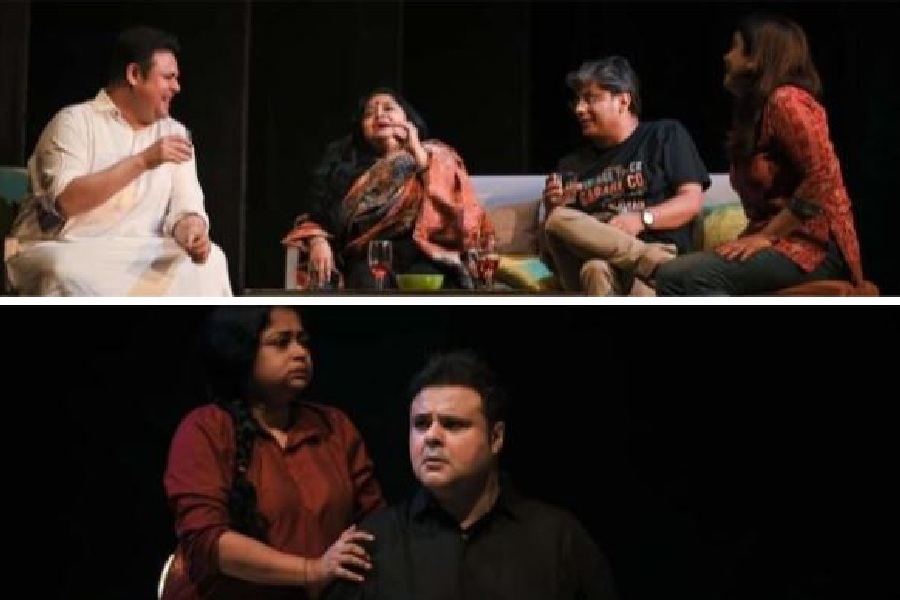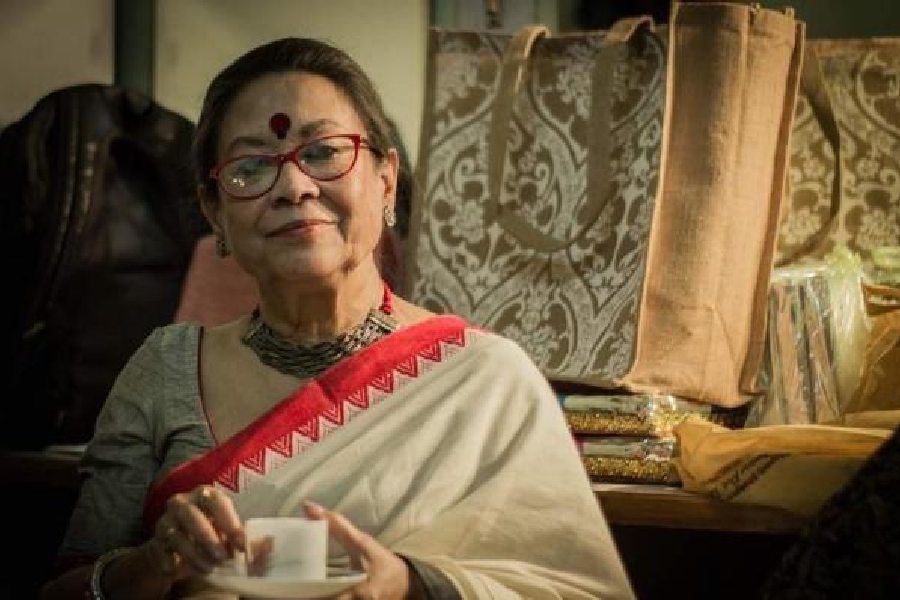Sohag Sen’s name in Bengali theatre comes among the pioneers. Whether conducting workshops for theatre actors or choosing direction on stage — her journey on stage is no less than a trailblazer. Ahead of the staging of her play Bheeti on June 2, at Madhusudan Mancha, Sen talks to The Telegraph about the play and opens up about her four-decade-long stage journey.

Ensemble's poster of Bheeti
You are considered a pioneer in conducting acting workshops in Bengal. What made you want to introduce it to your theatre students?
When students come to learn, they come with differently influenced minds, and many don’t know anything about theatre. We have a certain way of doing theatre, so to include them within that requires training. The concept of workshops started with this thought. We created a syllabus by ourselves based on my hands-on learning.
I used to work with Max Mueller Bhavan a lot... once they sent me to Germany. When I went there, I felt happy to realise that I was going in the right direction with workshops. I spoke to them regarding how they teach. Though I already knew it was the right way, getting their perspective was a kind of sanction on what I was doing. It was Stanislavski’s style only. By that time, I had already read Stanislavski. Instead of putting my students into a routine, we started doing what they would enjoy. Even now, in our theatre practice, the section concerning lectures is much less. After explaining to them the basics, we do everything hands-on. That helps them to understand easily and they enjoy it, too. That’s how workshops for us started.
Did the concept of the theatre workshop itself undergo any transformation over the years since you delved into it?
Yes, of course. We, ourselves, went through so much transformation. Now, there are many more ways to do it. This is because acting is an evolving art. It evolves with societal changes. Like earlier, the plays were about mythology, kings and queens, then it became social and political and now it is in people’s drawing rooms. The kind of acting required then was very elaborate. There was nothing bad about it, it was the requirement of that time. Now, that acting is no longer required. If we present a stylised version of something, we might use it but not in general naturalistic or realistic theatre. Many are coming with their training from other places. All of it is good.
Your play Bheeti was born out of a workshop. Could you take us through the journey of how this play was developed?
We have done many plays like this in the past. We did so maybe because we are looking for a script that we are not getting. So, to wait since we are not getting a script is not right. I begin my workshops with anything that’s socially or politically relevant to us or is causing trouble to us. That issue remains the focus. I give a situation and tell the group to make a scene out of it. They enjoy it. After all, theatre is a collective art and a director’s medium as well. Maybe not entirely a director’s medium but the director’s vision is there. But even then the actors get a lot of liberty to do what they want and have a conversation with us and everybody becomes included in that manner. If I see them getting derailed from the focal point then I interfere. And by the end, I write the play for them, too.

Moments from the play
I have done many scripted plays. There are many great scripts. But there are actors to whom the scripted characters can’t be given or maybe my actors are not fitting into those roles of a particular script. Then I try to create something of my own to keep them enthused; and myself, too. All out of necessity but we enjoy it. We did a play called Sirir Nichey, which was all about hired helps of different kinds. These kinds of plays take a lot of time. It took us over six months to do it.
What is more thrilling for you as a director — scripted or unscripted plays?
I enjoy both. When I did Sonata, I had to take actors from outside. It was a trilingual play and the characters were all middle-aged women. But I didn’t have that kind of actors at that time in the group. So, I had to take them from outside. I did one of the characters and Yama Shroff and Anashua Majumdar did the two other characters. There was nobody in the group apart from me who fitted this play. So, I did a part. But I usually don’t act when I am directing. My first two plays for the Ensemble group were two playlets from Bertolt Brecht’s Fear and Misery of the Third Reich. I translated the Jewish Wife and Informer. This time, in Bheeti, I am not keeping any German aspect in the play. It is influenced by Brecht’s Fear and Misery of the Third Reich. There are two families and it is about what they are going through while being panic-and-terror-stricken.
How important is the concept of workshop in theatre as an art form?
Now, many are doing it. It is a very important thing. It is not something that is done only for fun. A script directs us to a way but here that is not there, so it is more painstaking. Workshops help me to select who can do which character better. In the process, I come up with a character for them, too. But with a scripted script, it is not possible. I definitely think it is part of the art form.
Theatre in Bengal has time and again been a mirror to contemporary society, and your play, too, paints a picture of the contemporary socio-political scenario of our country through the dynamics of interpersonal relationships. Compared to films, does theatre enjoy more freedom in this respect?
Yes, theatre here always had more freedom than films. Earlier, in Maharashtra, the script had to be censored after it was written. But here it was never the case. There were a few where the political parties of those times might have stopped their shows or protested... but that doesn’t happen here a lot. We staged the Turkish play Avalanche to reflect on the socio-political situation. These plays excite me at times and then I am driven to do it.
Your association with the stage is over four decades. What is theatre to you?
Now, it is absolutely a part of me. I do a lot of things but I don’t do anything leaving theatre aside. I confess that rehearsals are more exciting to me than shows. Because in rehearsals, something is growing; the mental space is different. Once it is done, the shows obviously need to be done otherwise what’s the point?! I definitely like shows but I like rehearsals more because during rehearsals something gets created. As a person in the creative world, it excites me more.
After Tripti Mitra, you kind of led the way for contemporary women stage directors. What made you take up direction on stage?
I first got up on the stage against my will for Utpal Dutt’s play Leniner Daak. I had to play the character that Aparna (Sen) used to play. It used to happen regularly, thrice a week. Aparna went to shoot and couldn’t do it for some time. Then I was called to do it.
At first, I felt very scared and embarrassed. I used to speak less Bangla at that time than I do now. So, I felt a little scared since I had to speak in Bangla. But while doing that, what really interested me was backstage.
When we see a play, we always think about what we are seeing on stage but the backstage is also equally important. If the backstage is not right, the thing we do in the play won’t show right. I used to observe how everything was being created. I liked acting but these used to fascinate me more. We didn’t have much money, so we couldn’t make elaborate sets. Everyone used to make the set there and we could see it, too. So, we were very involved in it. But even then I did not know that I was going to be a director.
Then after many years, I had to create my own group called Ensemble but even then I did not think that I would direct. We had a very senior actor-director in our group. I had asked him to direct our plays but he was an asthma patient and he couldn’t do it. Then I walked in. I was not just doing acting but was also thinking about other aspects of the stage. Now, I am glad that there are so many women directors. At that time I did not give it much thought. I used to see theatre a lot but didn’t know much about the theatre world. That is why, being a theatre director was not a big thing for me. I just considered myself a theatre worker. Now, after 41 years, I can’t say that anymore.
What are your thoughts on the contemporary theatre practices in Bengal?
There are people who are not totally prepared when they are coming on stage, there are some that are doing great. Some new boys and girls are coming and thinking differently, I also like that. I always feel theatre might go through ups and downs but it will never die. With the advent of television, theatre was going through a slump. Now, everything is there. Nothing stopped. I like experimenting with the form.
Are the theatre spaces available in Calcutta at present conducive to the kind of theatre happening in the city?
What I don’t like is the concept of huge halls. Earlier, people used to sit for two-and-a-half hours to watch a play but everything has changed. My plays are all one hour and thirty minutes or one hour and forty-five minutes. Not more than that. People don’t want to see more than that. That is because people can see 30-second reels now at home, so their attention span has reduced.
Now we don’t need to say something twice. The audience picks it up quickly. With such big halls, it is firstly difficult to fill up the seats and the play also has to be done accordingly. My first play was in Kala Kunj which is the basement of Kala Mandir. In Max Mueller Bhavan I did many plays. I did a multimedia format of Journey into German Theatre. During Brecht’s centenary, I did The Seven Deadly Sins and called it Paap. So, I wish there were small theatre spaces... then it would work very well. I really wish for a space where there is an open space, amphitheatre or theatre travelling from one floor to another, then we can experiment a lot more.
